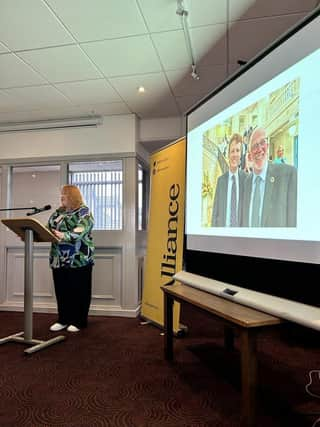Naomi Long dodges question on whether she supports Irish legal action against UK


Upper Bann MLA Eoin Tennyson said Dublin’s actions were "welcome and sadly necessary".
He made the remarks on social media after Ireland announced legal action against the UK government over its legislation halting prosecutions and civil cases on Troubles-related deaths.
Advertisement
Hide AdAdvertisement
Hide AdThe News Letter wanted to know if Mrs Long as a former justice minister agreed with her MLA’s remarks – and whether she supported the legal action taken by Dublin – so we asked the Alliance Party four questions. Alliance did not address the queries. It merely restated its leader’s opposition to the UK legislation.
An Alliance spokesperson said Naomi Long “is on record, when serving as justice minister, as to her view this legislation is an insult to victims and an egregious interference in due process and the justice system, which could undermine public confidence in it. Her view remains unchanged”.
Posting on X, formerly Twitter, Mr Tennyson had said: “It is regrettable that it has come to this, but welcome and sadly necessary that the Irish government will pursue an interstate case. The Legacy Act is a flagrant and shameful attack on the rights of victims, and has no political support or legitimacy in NI.”
However, Mrs Long’s deputy Stephen Farry gave implicit support for the Irish government’s actions, saying the Legacy Act must be dealt with as a matter of international law.
Advertisement
Hide AdAdvertisement
Hide AdWriting on social media platform X, Mr Farry did not explicitly back the legal case, but said: “The inter-state case on legacy shouldn't come as a surprise. It is the product of a unilateral Legacy Act, originally designed to address the demands of one interest group, and without the support of the Irish government, all main NI parties, and crucially victims' groups. The Act is contrary to human rights standards. This now needs to be addressed as a matter of international law. UK and Irish co-operation over restoring political institutions in NI must continue in parallel.”
The Ulster Unionist Party leader Doug Beattie also said that the Irish government decision to sue was "not surprising".
Mr Beattie, like Mr Farry, did not criticise Dublin's legal action against the UK, but he did make more general criticism of Dublin. He said that "the reality is the Irish government have done nothing to address the legacy of our past, they have refused to open parallel mechanisms or deal with the very real fact that Ireland was not an innocent bystander in the troubles".
He added: "Any interstate case will go through the courts and there will be an outcome at the end. But if both the United Kingdom government and the Irish government are not willing to fix the wrongs of the past then it will be the victims who suffer once again."
Advertisement
Hide AdAdvertisement
Hide AdThe law came into effect in September, and was opposed by all of Northern Ireland’s main parties. Critics argue it creates a de-facto amnesty for Troubles killers.
Jim Allister slammed the Irish government for taking the legal action – given its lack of action against the Provisional IRA during the Troubles. The TUV leader said: “For the entirety of the PIRA campaign the Republic acted as a safe haven for terrorists from which they could launch attacks and to which they could flee save in the the knowledge that once over the border there was little prospect of them facing justice.
“Figures published by the House of Commons show that between 1973 and 1997 there were 110 requests for extradition from the Republic of Ireland by the UK. Of those, just 8 were successful. Frequently, terrorists successfully cited the constitution of the Irish Republic when fighting attempts to bring them back to face justice in Northern Ireland. Even after the Anglo Irish Agreement – in which Dublin promised increased cooperation on security – the situation failed to improve.”
Mr Allister added: “It is a gross dereliction of duty by our own Government not to make these obvious points at the current time and very telling that Alliance are prepared to aid the Nationalist rewrite of history by ignoring them as well.”
Advertisement
Hide AdAdvertisement
Hide AdThe News Letter also asked if Alliance held the justice ministry in a restored executive, would it commit to upholding its legal obligations under the legacy act – and whether Alliance would support all ministers and departments following their legal obligations under the act. The party did not respond directly to these questions.
• Morning View, page 14
Comment Guidelines
National World encourages reader discussion on our stories. User feedback, insights and back-and-forth exchanges add a rich layer of context to reporting. Please review our Community Guidelines before commenting.